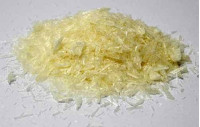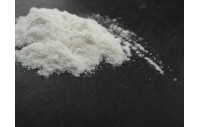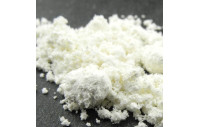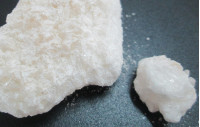
Buy APICA for sale online from USA vendor
Table of Contents
- Introduction
- Chemistry
- Pharmacology
- Subjective Effects
- Dosage
- Physical Effects
- Cognitive Effects
- Toxicity and Harm Potential
- Tolerance and Addiction Potential
- Overdose
- Legal Status
Introduction
APICA, also known as SDB-001 and 2NE1, is a synthetic cannabinoid that has garnered attention for its cannabis-like effects upon administration. This compound has exhibited potent agonist activity towards both the CB1 and CB2 cannabinoid receptors.
Origin and Naming
The moniker "2NE1" appears to draw inspiration from the South Korean all-girl K-Pop group, a naming convention shared with the closely related chemical AKB48. In 2011, APICA and its counterpart were initially identified in Japan, where they were found as a mixture in a product marketed under the name "Fragrance Powder". Since then, APICA has been accessible for purchase as a research chemical from online vendors.
Routes of Administration
Synthetic cannabinoids like APICA are often consumed through smoking or vaporization to achieve rapid onset of effects and quick offset. Limited information is available regarding alternative routes of administration for APICA, though it is plausible that, similar to other synthetic cannabinoids, it may exhibit oral activity when dissolved in lipids, potentially prolonging its duration of action. Notably, APICA is insoluble in water but dissolves in ethanol and lipids.
Safety Concerns and Recommendations
In contrast to natural cannabis, the chronic misuse of synthetic cannabinoids has been associated with numerous fatalities and heightened risks of adverse effects and toxicity. As such, prolonged or excessive usage of APICA is strongly discouraged. Individuals considering the use of this substance are strongly advised to conduct comprehensive independent research and adhere to harm reduction practices to mitigate potential risks.
In conclusion, APICA represents a novel synthetic cannabinoid with intriguing properties that warrant further exploration, albeit with caution due to safety concerns associated with its misuse. Thorough understanding and responsible usage are essential for minimizing potential harms associated with its consumption.
Chemistry
Structure of APICA
APICA, also known as N-(1-adamantyl)-1-pentyl-1H-indole-3-carboxamide, belongs to the class of synthetic indole cannabinoids. Structurally, like many synthetic cannabinoids, APICA comprises four linked structures: core, bridge, head, and tail. In APICA, the core indole group is substituted at R1 with a pentyl chain tail and at R3 with a carboxamide bridge linking to an adamantyl head. Notably, APICA shares analogies with AKB48, which features an indazole instead of an indole group, and STS-135, where the pentyl tail is further substituted with a terminal fluorine.
Pharmacology
Receptor Activity
APICA functions as a full agonist of cannabinoid receptors, displaying comparable potency at both CB1 and CB2 receptors. In vivo experiments, particularly in rat models, have indicated that APICA exhibits potency similar to Δ9-THC and approximately one-third of the potency of JWH-018. Additionally, APICA appears to have a longer duration of effect compared to these cannabinoids. However, caution is warranted in interpreting animal studies, as human responses may vary significantly.
Pharmacological studies have determined EC50 values of approximately 6.89 ± 0.11nM at CB1 and 7.54 ± 0.11nM at CB2 [1]. While APICA likely shares in vivo properties with Δ9-THC, the exact mechanisms underlying its interactions and their correlation with the cannabinoid high remain to be scientifically validated.
Metabolism
In vivo metabolic studies have revealed that APICA undergoes complete metabolism, with no detectable original compound in urine. Major metabolites primarily involve mono- or dihydroxylation on the adamantyl ring system and monohydroxylation on the pentyl chain.
Subjective Effects
Disclaimer: The subjective effects listed below are based on the Subjective Effect Index (SEI), a compilation of anecdotal user reports and personal analyses of contributors to PsychonautWiki. These effects should be approached with skepticism as they may not occur predictably or reliably. Additionally, higher doses increase the likelihood of experiencing the full spectrum of effects, including potential adverse effects such as addiction, severe injury, or fatality.
Physical Effects
Spontaneous Physical Sensations
The "body high" induced by APICA is characterized by a sharp, uncomfortable, all-encompassing, and electric tingling sensation that spreads throughout the body following ingestion. This sensation tends to intensify rapidly upon onset, reaching its peak before promptly dissipating.
Motor Control Loss
APICA typically results in a partial to moderate suppression of motor control, with the degree of impairment escalating in proportion to the dosage. However, complete inability to walk or perform basic movements is rare.
Appetite Enhancement
Similar to many other cannabinoids, APICA elicits an increase in appetite, colloquially known as "the munchies" in American and British cultures. Clinical studies and survey data have documented that cannabis enhances food enjoyment and stimulates interest in food. This effect is attributed to the activation of cannabinoid receptors responsible for regulating food intake by endocannabinoids in the hypothalamus.
Pain Relief
Cannabinoids, including synthetic cannabinoid receptor agonists like APICA, have demonstrated clinical efficacy in providing pain relief through the agonism of CB1 and CB2 cannabinoid receptors.
Perception of Bodily Heaviness or Lightness
APICA may alter the perception of bodily sensations, leading to sensations of either increased heaviness or lightness.
Changes in Felt Gravity
Users may experience changes in the perception of gravity while under the influence of APICA.
Dehydration
Consumption of APICA can lead to dehydration, necessitating adequate hydration during and after use.
Dry Mouth
A common side effect of APICA consumption is dry mouth, colloquially referred to as "cotton mouth" in American and British cultures.
Vasodilation
Vasodilation, the widening of blood vessels, has been associated with cannabinoid use, although specific evidence for APICA is currently lacking.
Cognitive Effects
Anxiety & Paranoia
Compared to other cannabinoids, APICA has a heightened tendency to induce feelings of anxiety and paranoia. Consequently, individuals predisposed to these states of mind should exercise caution and consider avoiding its use.
Emotion Enhancement
APICA may enhance emotional experiences in users.
Thought Connectivity
Users may experience heightened connectivity between thoughts while under the influence of APICA.
Thought Deceleration
APICA can lead to a slowing down of thought processes.
Conceptual Thinking
The compound may influence conceptual thinking in users.
Increased Music Appreciation
APICA has been reported to enhance the appreciation of music.
Mindfulness
Users may experience increased mindfulness, or awareness of the present moment, while using APICA.
Analysis Suppression
The substance may suppress analytical thinking processes.
Dream Suppression
APICA may suppress dreaming during sleep.
Psychosis
Prolonged use of synthetic cannabinoids, including APICA, may elevate the risk of psychosis. This risk is particularly heightened in vulnerable individuals with predisposing factors for psychotic illnesses, such as a personal or family history of schizophrenia.
Auditory Effects
Enhancements
APICA may enhance auditory perceptions in users.
Distortions
Users may experience distortions in auditory perceptions while under the influence of APICA.
Toxicity and Harm Potential
Lack of Scientific Studies
The toxicity and long-term health effects of recreational APICA use have not been extensively studied in scientific contexts, primarily due to its limited history of human usage. Consequently, the exact toxic dosage remains unknown. Anecdotal evidence from community members who have experimented with APICA suggests that low to moderate doses taken sparingly may not produce significant negative health effects.
Pre-existing Mental Conditions
Individuals with severe pre-existing mental conditions are advised against ingesting synthetic cannabinoids like APICA due to their potential to strongly amplify one's current state of mind and emotions. Prolonged usage of synthetic cannabinoids, including APICA, may heighten the risk of mental illness and psychosis, especially in vulnerable individuals with predisposing factors such as a personal or family history of schizophrenia.
Proper Precautions
Given that synthetic cannabinoids are active in the milligram range, it is crucial to exercise proper precautions when dosing to prevent adverse experiences and self-harm. Utilizing harm reduction practices is strongly recommended for those using this substance.
Tolerance and Addiction Potential
Addiction Potential
Chronic use of APICA, like other synthetic cannabinoids, can lead to moderate addiction potential and a high likelihood of abuse. Psychological dependence may develop among certain users, leading to cravings and withdrawal symptoms upon cessation of use.
Tolerance
Tolerance to the effects of APICA typically develops with prolonged and repeated use, necessitating higher doses to achieve the desired effects. It takes approximately 3 to 7 days for tolerance to reduce to half and 1 to 2 weeks to return to baseline in the absence of further consumption. APICA also presents cross-tolerance with other cannabinoids, meaning that its use reduces the effectiveness of all cannabinoids.
Overdose
Reported cases indicate that overdose on APICA can lead to physical discomfort, including heart palpitations, vertigo, and sedation, even at doses lower than those considered dangerous. Overdosing may induce intense anxiety, paranoia, or lead to unconsciousness.
Legal Status
China
As of October 2015, APICA is classified as a controlled substance in China.
Germany
APICA is controlled under Anlage II BtMG (Narcotics Act, Schedule II) in Germany since December 13, 2014. It is illegal to manufacture, possess, import, export, buy, sell, procure, or dispense without a license.
Switzerland
APICA is a controlled substance specifically listed under Verzeichnis E in Switzerland.
United Kingdom
APICA is categorized as a Class B controlled substance under the third-generation synthetic cannabinoids generic definition in the United Kingdom. It is illegal to possess, produce, supply, or import APICA.
Frequently Asked Questions (FAQ)
-
What is APICA?
- APICA, also known as SDB-001 and 2NE1, is a synthetic cannabinoid that produces cannabis-like effects when administered.
-
How does APICA work?
- APICA acts as a potent agonist for the CB1 and CB2 cannabinoid receptors, similar to natural cannabinoids like THC.
-
What are the common routes of administration for APICA?
- APICA is commonly smoked or vaporized to achieve quick onset effects, but it may also be orally active when dissolved in lipids.
-
What are the typical doses of APICA?
- Threshold: < 0.5 mg
- Light: 0.5 - 1.5 mg
- Common: 1.5 - 2 mg
- Strong: 2 - 4 mg
- Heavy: 4 mg +
-
What are the physical effects of APICA?
- Physical effects may include spontaneous physical sensations, motor control loss, appetite enhancement, pain relief, perception of bodily heaviness or lightness, changes in felt gravity, dehydration, dry mouth, and vasodilation.
-
What are the cognitive effects of APICA?
- Cognitive effects may include anxiety and paranoia, emotion enhancement, thought connectivity, thought deceleration, conceptual thinking, increased music appreciation, mindfulness, analysis suppression, dream suppression, and psychosis.
-
Is APICA toxic?
- The long-term health effects of APICA are not well-studied, but chronic use may increase the risk of mental illness and psychosis, particularly in vulnerable individuals.
-
Is APICA addictive?
- APICA can be moderately addictive with a high potential for abuse, leading to psychological dependence among some users.
-
What should I do in case of overdose?
- Overdose on APICA may cause physical discomfort and intense anxiety or paranoia. Seek medical attention if necessary.
-
What is the legal status of APICA?
- APICA is classified as a controlled substance in various countries, including China, Germany, Switzerland, and the United Kingdom.
To prepare the content, the following materials were used:
- FDA Substance Registration System
- Hazardous Substances Data Bank. National Library of Medicine. 28 August 2008. Retrieved 22 August 2014. 3,4-Methylenedioxymethamphetamine
- Liver transplant modulates gut microbial dysbiosis and cognitive function in cirrhosis. PDF . By HoChong Gilles, Scott C Matherly, Mohammed S Siddiqui, Puneet Puri...
- Differential impact of hyponatremia and hepatic encephalopathy on health-related quality of life and brain metabolite abnormalities in cirrhosis . By Jasmohan Bajaj
- An overview of alcohol and other drug issues
- Medicating the mind: a Kantian analysis of overprescribing psychoactive drugs B A Manninen
- The pharmacological basis of opioids Carla Ghelardini, Lorenzo Di Cesare Mannelli and Enrica Bianchi
- Ask Dr. Shulgin Online ARCHIVE: June 3, 2004
- Inhibition of plasma membrane monoamine transporters by β-ketoamphetamines. Nicholas V Cozzi, Michael KSievert, Alexander T Shulgin, Peyton JacobIII, Arnold Eruoho
- Schedules of Controlled Substances: Placement of Methylone Into Schedule I
- Bioanalysis of new designer drugs. Wohlfarth A, Weinmann W.
- New Psychoactive Substances (including synthetic cannabinoids, mephedrone, and more)
- Future Synthetic Drugs of Abuse. Donald A. Cooper. Drug Enforcement Administration McLean, Virginia
- Designer drugs: a medicinal chemistry perspective. F. Ivy Carroll Anita H. Lewin S. Wayne Mascarella Herbert H. Seltzman P. Anantha Reddy
- Synthetic cannabinoids in Europe
- Pharmacological Effects of MDMA in Man. By Enno Freye
- Drug Use in Relation to Outcome of Mammography Screening. von Euler-Chelpin M, Wu W, Vejborg and Lynge E
- DEA Drug Scheduling
- Electrophysiological Effects of Trace Amines on Mesencephalic Dopaminergic Neurons.Ada Ledonne, Nicola Berretta, Alessandro Davoli, Giada Ricciardo Rizzo, Giorgio Bernardi and Nicola Biagio Mercuri
- Electrophysiological evidence for a reciprocal interaction between amphetamine and cocaine-related drugs on rat midbrain dopaminergic neurons.Scarponi M, Bernardi G, Mercuri NB.
- Overdose of Drugs for Attention-Deficit Hyperactivity Disorder: Clinical Presentation, Mechanisms of Toxicity, and Management. Henry A. Spiller, author Hannah L. Hays Alfred Aleguas.
- Dose-dependent effectiveness of wheel running to attenuate cocaine-seeking: impact of sex and estrous cycle in rats. Peterson AB, Hivick DP, Lynch WJ.r.
- FDA Drug Safety Communication: Safety Review Update of Medications used to treat Attention-Deficit/Hyperactivity Disorder (ADHD) in children and young adults
- ADHD Medications and Risk of Serious Cardiovascular Events in Young and Middle-aged Adults
- Controlled Substances Act
- The Art of Drug Synthesis (Wiley Series on Drug Synthesis)
- Cannabis: domestic cultivation widespread
- A review of the influence of functional group modifications to the core scaffold of synthetic cathinones on drug pharmacokinetics
1kg $1690
500g $1080
1kg $1590
100g $390
100g $390
100mg $840
500g $1080
1kg $1690
1kg $1690
1kg $1890
100g $550












